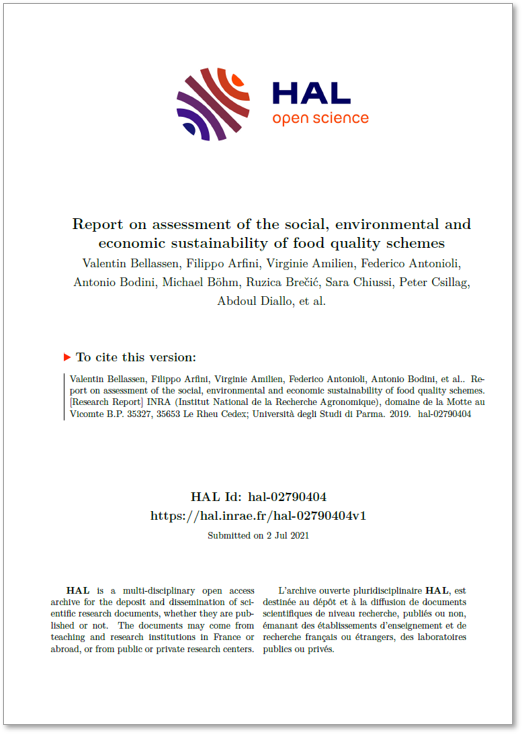Assessment of the Social, Environmental and Economic Sustainability of Food Quality Schemes (FQS)
Bellassen et al. (2019) | Horizon 2020 Project: Strength2Food
This report provides a comprehensive evaluation of 29 Food Quality Schemes (FQS) across Europe and beyond, including organic products, Protected Designation of Origin (PDO), and Protected Geographical Indication (PGI) goods. The authors apply a standardized, multi-criteria methodology using 20 key indicators to compare certified products with their conventional counterparts across the value chain—from farm to processing and retail.
The report focuses on three dimensions of sustainability: economic, environmental, and social. The aim is not only to measure performance but also to uncover how quality schemes contribute to more sustainable agri-food systems.
Economic Sustainability
A clear strength of certified food schemes lies in their economic performance. Across almost all product categories, FQS products demonstrate a substantial price premium compared to non-certified equivalents. For example, PDO Comté cheese in France commands a retail price 84% higher than Emmental, while PDO Parmigiano-Reggiano in Italy fetches 61% more at the processing level than a generic hard cheese.
This price premium often translates into higher profitability. In Comté’s case, farmers and processors both enjoy higher gross operating margins and net results, despite stricter production requirements. These benefits are further reinforced by the local economic impact: Comté and Parmigiano-Reggiano both exhibit strong local multiplier effects, meaning a significant portion of each euro spent is re-spent within the local economy. For Parmigiano-Reggiano, every euro in turnover generates €2.64 in local economic activity, a testament to its deeply rooted regional value chain.
Environmental Sustainability
The environmental impacts of FQS products vary but often show clear advantages, especially when it comes to carbon emissions and food miles.
-
PDO Comté cheese demonstrates a 15% lower carbon footprint and 26% fewer food miles than its conventional counterpart, largely thanks to more efficient processing and local sourcing of feed.
-
In contrast, PDO Parmigiano-Reggiano has a higher carbon footprint (+79%), mainly due to its intensive processing needs, but offsets this with a lower footprint at the farm level (-18%), owing to better livestock management and feed choices.
-
PDO olive oil from Croatia performs especially well environmentally, producing 45% fewer emissions and traveling 80% shorter distances than conventional olive oil.
Water usage is another key dimension. Organic and PDO products often fare better or comparably. For instance, Comté’s grey water footprint is 27% lower per hectare, and Parmigiano-Reggiano shows reduced overall water consumption due to different cropping systems and restrictions on silage use.
Social Sustainability
On the social front, FQS products tend to generate more employment, preserve traditional knowledge, and enhance local governance structures. In Comté production, for example, the value chain is 34% more labour-intensive at farm level than its conventional reference. The PDO system also encourages more balanced bargaining power across stakeholders, reducing the risk of dominance by any single actor.
Educational levels among producers and processors are often higher in certified systems. This trend is particularly evident in PDO olive oil and Zagora apples, where education levels are up to 30% higher than in the conventional systems.
However, gender equity remains a mixed picture. Some FQS supply chains—like Comté at the farm level—show improved gender balance, while others, such as PDO Parmigiano-Reggiano and PDO olive oil in Croatia, still face challenges due to low female representation in management and ownership.
Innovations and Key Takeaways
The report underscores the innovative nature of FQS as both technological and social systems:
-
Many certified products rely on refined feed compositions, low-input farming, or processing innovations that reduce emissions or water use.
-
The integration of local actors into cooperative governance structures enhances resilience and distributes value more fairly.
-
Links between technical specifications and sustainability outcomes are well demonstrated: for instance, Comté’s requirement for local feed drives both economic and environmental benefits.
Overall, the findings support the idea that FQS contribute positively to sustainability goals—particularly when production is localized, transparent, and embedded in well-functioning cooperatives or governance networks. They show promise not only as market tools but also as policy levers to strengthen rural economies and promote sustainable food systems.

